| Srl | Item |
| 1 |
ID:
076037
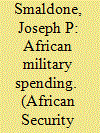

|
|
|
| 2 |
ID:
094147
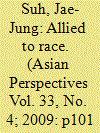

|
|
|
| 3 |
ID:
055068
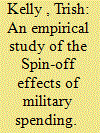

|
|
|
| 4 |
ID:
094143
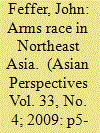

|
|
|
| 5 |
ID:
056680


|
|
|
| 6 |
ID:
122372
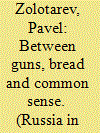

|
|
|
|
|
| Publication |
2013.
|
| Summary/Abstract |
The current trend is such that military force is gradually turning from a foreign policy tool into a military power potential. The purpose is to solve political tasks without using military force but relying entirely on the superiority in military potential.
|
|
|
|
|
|
|
|
|
|
|
|
|
|
|
|
| 7 |
ID:
094149
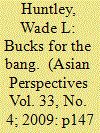

|
|
|
| 8 |
ID:
132460
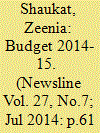

|
|
|
|
|
| Publication |
2014.
|
| Summary/Abstract |
This year's budget presented by the PML-N has been centred around economic growth.The question is whether this growth will be achieved at the expense of the masses.
|
|
|
|
|
|
|
|
|
|
|
|
|
|
|
|
| 9 |
ID:
140831
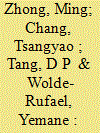

|
|
|
|
|
| Summary/Abstract |
We revisit the causal relationship between military spending and unemployment in the G7 countries applying a bootstrap panel causality analysis that accounts for both cross-sectional dependence and for heterogeneity across countries. Using per capita real GDP as a controlled variable, we found a unidirectional causality running from military spending to unemployment for Canada, Japan, and the US, one-way causality running from unemployment to military spending for France and Germany, and bidirectional causality for Italy and the UK. The empirical evidence does not seem to provide consistent results regarding the causal relationship between military spending and unemployment in G7 countries.
|
|
|
|
|
|
|
|
|
|
|
|
|
|
|
|
| 10 |
ID:
094145
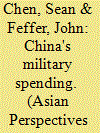

|
|
|
| 11 |
ID:
080087
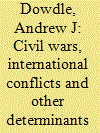

|
|
|
|
|
| Publication |
2007.
|
| Summary/Abstract |
Previous research on African military spending suggests the existence of civil strife as the best predictor of high levels of military spending. However, little is known about why some African nations maintain strong 'auxiliary' or paramilitary organizations while others do not. This study finds that the presence of civil or interstate war does not strengthen reserve or irregular forces. Civilian governments promote strong paramilitary organizations to counter any threat the regular military might pose to regime survivability as a form of clientelist politics
|
|
|
|
|
|
|
|
|
|
|
|
|
|
|
|
| 12 |
ID:
189450
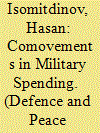

|
|
|
|
|
| Summary/Abstract |
This study examines the trend and comovements of military expenditures across 70 countries from 1967 to 2018. While previous research recognizes the degree of cross-correlations using principal components analysis, we adopt a dynamic factor model with time-varying stochastic volatility to examine the trend and comovements in military spending. Specifically, the dynamic factor model allows us to partition the trend of military spending into global, regional, and country-specific components. We find significant evidence of the global factor that explains a considerable portion of the variation in military spending across countries. Moreover, our findings reveal a significant time variation in the importance of the global factor. We also show the presence of regional and country-specific factors in the military spending of countries, but the importance of the regional factor is less than that of the global and country-specific factors. Additionally, we find that countries under consideration are becoming less exposed to global influences with respect to their decisions in military spending over time.
|
|
|
|
|
|
|
|
|
|
|
|
|
|
|
|
| 13 |
ID:
144469
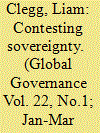

|
|
|
|
|
| Summary/Abstract |
There is a battle over military expenditure at the International Monetary Fund, with consistent pressure from its most powerful member for the Fund to get tough on military expenditure being pitted against lowerorder states' invocation of the organization's sovereignty-protecting rules and practices. While the formal victory of the lower-order states has been codified in the Fund's relatively weak Guidelines on Military Expenditure, on a case-by-case basis policy shifts continue to be imposed on borrowers through the application of informal influence by the US Executive Director in the IMF boardroom. By integrating insights from literature exploring the tension between formal rules and informal practices in international organizations, this case study extends the understanding offered in the international relations literature of the foundations of sovereign inequality in international politics.
|
|
|
|
|
|
|
|
|
|
|
|
|
|
|
|
| 14 |
ID:
192040
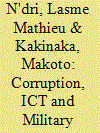

|
|
|
|
|
| Summary/Abstract |
It has been argued that large military spending is often a crucial constraint in Sub-Saharan Africa (SSA) countries, and high corruption has enabled these countries to keep such large military spending. One possible remedy is to promote information and communication technology (ICT), which may cause the anti-corruption policies to become more effective in increasing transparency for the public and reducing unnecessary and abusive military spending. This study discusses the nexus among corruption, military spending, and ICT with a panel data of 48 SSA countries from 2003 to 2015. Our analysis reveals that when ICT prevails, military spending is negatively associated with the control of corruption, so that anti-corruption policies with the usage of ICT could reduce the extravagant budget allocation to military spending. Policymakers should associate sound ICT policy with traditional anti-corruption factors to bring more transparency and less corrupt behaviors in the military department. The reduction in the misuse of military allocation enables the country to increase nonmilitary public spending to face sustainable development challenges for the sake of the population.
|
|
|
|
|
|
|
|
|
|
|
|
|
|
|
|
| 15 |
ID:
116064


|
|
|
|
|
| Publication |
2012.
|
| Summary/Abstract |
This paper considers the effect of corruption and military spending on economic growth, analysing both the direct impact of public spending and the effect of allocating resources between categories of public spending within the framework of an endogenous growth model. The model exhibits non-linearities as a result of the links between the components of public spending, corruption and economic growth. The main findings of the empirical analysis confirm the expectation that corruption and military burden lower the growth rate of gross domestic product per capita. They also suggest that when the effect of the complementarity between military spending and corruption is omitted, as in most studies, the impact of military burden on economic performance is underestimated.
|
|
|
|
|
|
|
|
|
|
|
|
|
|
|
|
| 16 |
ID:
113329
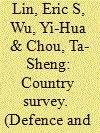

|
|
|
|
|
| Publication |
2012.
|
| Summary/Abstract |
In this article we survey military spending, the evolution of national defense policy, and the role that defense spending played in economic activities in Taiwan from 1952 to 2009. With the ongoing cross-Strait dialogue and closer commercial ties between Taiwan and China, the share of military spending in government expenditures (or GDP) has tended to gradually decline, which is in accordance with the change in defense policy from an offensive posture to a defensive-oriented attitude. In addition, we investigate the defense spending-inflation nexus in Taiwan. The multivariate structural change test identifies two break points and three regimes are categorized accordingly. The Granger causality test based on the VAR model reveals that the heavy defense burden in Taiwan during 1952-71 (the first regime) is essentially an important factor causing the higher price levels. However, when the tension across the Taiwan Strait is alleviated as well as the defense-oriented policy adopted, the military spending no longer plays a crucial role in determining inflation in the recent two regimes. Sensitivity analysis confirms that our results are robust to different model specifications.
|
|
|
|
|
|
|
|
|
|
|
|
|
|
|
|
| 17 |
ID:
119265
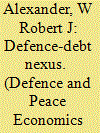

|
|
|
|
|
| Publication |
2013.
|
| Summary/Abstract |
The literature in defence economics has tended to focus on the relationship between defence spending and economic growth. Studies examining the linkage between defence spending and government debt have been relatively rare. Given the recent Global Financial Crisis, originating in the developed economies, and the changed international security picture since 9/11, it is timely to reconsider the defence-debt nexus in the rich economies. This study pays particular attention to developing an empirical strategy which is both soundly based on economic theory concerning the evolution of public debt and which uses econometric methods that are welladapted to the dynamic aspects of the relationship. From the standpoint of economic theory, if a government seeks to minimize the distortionary costs of taxation, then taxation will follow a random walk. Unexpected shocks (war and recession) will cause debt. Other idiosyncratic national-level political considerations that affect the evolution of debt can be factored out by the use of a dynamic panel estimation method. Employing the Arellano-Bond dynamic panel model to the data available from members of the Organization for Economic Co-operation and Development and North Atlantic Treaty Organization over the periods 1988-2009 and 1999-2009, this study finds that the defence burden is a statistically significant and economically important determinant of public debt.
|
|
|
|
|
|
|
|
|
|
|
|
|
|
|
|
| 18 |
ID:
162243
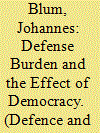

|
|
|
|
|
| Summary/Abstract |
Do democracies spend less on national defense? This paper provides new evidence of the effect of democracy on defense burden based on a Spatial Durbin Model with panel data for 98 countries for the years 1992–2008. While democracy measured by means of an index variable covering the entire range from perfect democracy to perfect autocracy turns out to be insignificant, dummy variables indicating transition to higher levels of democracy reveal a statistically highly significant negative effect of democracy on a country’s defense burden. Allowing for country-specific effects reveals heterogeneity in the effect of democracy across countries. Apart from the effect of democracy, the estimation results indicate strong spatial dependence of military burdens across countries. Moreover, they provide statistical evidence for a peace dividend, for substitution effects in defense spending and for a negative effect on the military burden for countries when they exhibit a trade surplus instead of a trade deficit.
|
|
|
|
|
|
|
|
|
|
|
|
|
|
|
|
| 19 |
ID:
083242
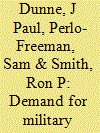

|
|
|
|
|
| Publication |
2008.
|
| Summary/Abstract |
This paper considers the interpretation of the empirical results of the developing literature on the demand for military spending that specifies a general model with arms race and spill-over effects and estimates it on cross-section and panel data. It questions whether it is meaningful to talk of an 'arms race' in panel data or cross-section data, and suggests that it may be more appropriate to talk about the relevant variables - aggregate military spending of the 'Security Web' (i.e. all neighbours and other security-influencing powers) and the aggregate military spending of 'Potential Enemies' - as acting as proxies for threat perceptions, which will reflect both hostility and capability.
|
|
|
|
|
|
|
|
|
|
|
|
|
|
|
|
| 20 |
ID:
129496
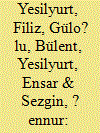

|
|
|
|
|
| Publication |
2014.
|
| Summary/Abstract |
This study analyzes the determinants of arms production in 15 countries using annual panel data from 1997 to 2002. The results suggest that real GDP per capita, military expenditures, arms exports, and arms imports are positively related to arms production.
|
|
|
|
|
|
|
|
|
|
|
|
|
|
|
|